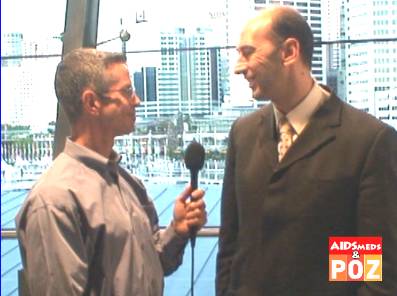Click here to see a video interview with Simon Mallal, MD.
A clinical trial has confirmed that a simple lab test for a human gene can help prevent a serious allergic reaction caused by abacavir, the active ingredient in Ziagen and a component of Epzicom (Kivexa) and Trizivir. Reporting at the fourth IAS Conference on HIV Pathogenesis, Treatment and Prevention (IAS 2007), in Sydney, the study authors argue that there is now enough evidence to support the routine use of the test to greatly reduce the risk of this side effect.
The allergy, frequently referred to as an abacavir hypersensitivity reaction (AHR), is a serious side effect that occurs in up to 8 percent of those taking the drug. Symptoms, including fever, rash and shortness of breath, often worsen with continued use of the drug. These symptoms can be fatal, especially if the drug is stopped and then restarted.
Various studies have shown that people with an inherited gene (called HLA-B*5701) are significantly more likely to experience an AHR than those who don’t have the gene.
A number of studies have found that excluding patients with the gene from abacavir therapy has helped to greatly reduce the risk of AHRs. Frequently used in Europe and Australia, the test has been slow to catch on in the United States, though it is available through several commercial laboratories.

Click here for video interview with Dr. Mallal.
At IAS 2007, Simon Mallal, MD, of Royal Perth Hospital in Perth, Australia, and his colleagues presented results from PREDICT-1—a widely anticipated clinical trial that evaluated HLA testing in 1,956 European and Australian HIV-positive patients looking to start antiretroviral (ARV) therapy incorporating abacavir.
Patients were randomized to either begin abacavir treatment without testing, or to be tested for HLA-B*5701 and then use abacavir accordingly. Patients in the testing group found to have the gene did not start abacavir, whereas those who did not have the gene were permitted to begin treatment with the drug.
All patients who went on to be treated with abacavir were followed by the researchers for six weeks.
If symptoms of AHR occurred among those on abacavir treatment, the allergy was ’clinically’ diagnosed. This was followed up using a skin test to confirm an allergy to abacavir.
Among those who underwent testing at the start of the trial, HLA-B*5701 was documented in 5.7 percent of the patients. Sixty percent of those found to have the gene were white; fewer than 1 percent were African or African-American.
AHR was clinically diagnosed in 7.8 percent of those who didn’t test and 3.4 percent of those who did. Skin testing confirmed AHR in 2.7 percent on those who didn’t receive the HLA test. Among those in the HLA-tested group who were clinically diagnosed, there were no confirmed cases of AHR.
Dr. Mallal reported that the negative predictive value of HLA testing was 100 percent. In other words, if the test does not document the presence of HLA-B*5701, it is highly unlikely that a true hypersensitive reaction to abacavir treatment will occur.
The positive predictive value was only 48%, however, due to the fact that some patients with HLA-B*5701 did not experience AHR while in the study.
Based on these predictive values, for every 100 patients in PREDICT-1, 94 who tested negative for HLA-B*5701 faced a negligible risk of developing an AHR. Among the six who tested positive for HLA-B*5701 and were removed from the study, Dr. Mallal’s group estimated that four patients headed off an AHR and two were unnecessarily prevented from taking the drug.
The risk factors for clinically diagnosed AHR included being white and using either a non-nucleoside reverse transcriptase inhibitor or a protease inhibitor at the same time as abacavir.
The only risk factor for a confirmed AHR diagnosis was the presence of HLA-B*5701.
In conclusion, Dr. Mallal said routine HLA testing would greatly reduce the risk of AHR, while denying the drug to only a few individuals who carry the HLA-B*5701 gene but wouldn,t go on to experience an allergic reaction. “Where screening is not available,” he added, “prescribing abacavir with vigilance remains necessary.”



Comments
Comments